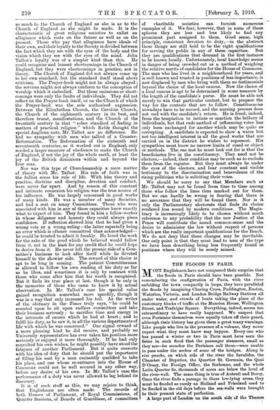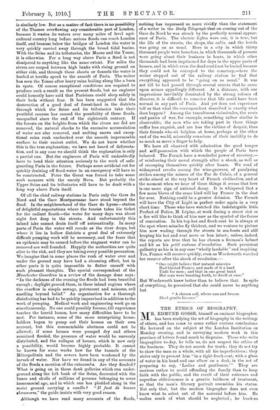THE FLOODS IN PARIS.
-Aron Englishmen have not conquered their surprise that _LV_L the floods in Paris should have been possible. Not remembering the configuration of Paris, with the river enfolding the town compactly in loops, they have paralleled the floods by imagining Charing Cross, Paddington, Easton, Waterloo, Victoria, and London Bridge Railway Stations all under water, and crowds of boats taking the place of the customary blocks cf traffic at the Mansion House, Wellington Street, and Trafalgar Square. Everything, indeed, seems too extraordinary to have really happened. We suspect that even Parisians themselves were equally taken of their guard, although their history has given them a great many warnings. Like people who live in the presence of a volcano, they never expect what they must know may happen. Every one who has passed a winter or two in Paris must have seen the Seine in such flood that the passenger steamers, small as they are—lee nu:ruches the Parisians call them—were unable to pass under the arches of some of the bridges. Along /a rive gauche, on which side of the river the Invalides, the Chamber of Deputies, the Quartier St. Germain, the Quai D'OrsEry, the Foreign Office, the Sorbonne, and the whole Latin Quarter lie, thousands of acres are below the level of the river-wall. The same thing is true of Auteuil and Hem% Once the river finds a passage to these low-lying areas, they must be flooded as surely -as Holland and Friesland used to be flooded in the old days before the sea-walls were brought to their present state of perfection.
A large part of London on the south side of the Thames is similarly low. But as a. matter of facts there:is no possibility of the Thames overflowing any-considerable part of London, because it wastes its waters over many miles of level agri- cultural country long before serious floods can reach London itself, and because below the bridges of London the water is very quickly carried away through the broad tidal basins. With the Seine and its tributaries, the Marne and the Yonne, it is otherwise. For a long way above Paris a flood is not dissipated to anything like the same extent. For miles the rivers are cooped between high banks with rising ground on either side, and through these shoots or funnels the water is hurled at terrific speed to the assault of Paris. The writer has seen the Yonne after heavy rains boiling along like a burn in spate. Of course exceptional conditions are required to produce such a result as the present floods, but no engineer could honestly have said that Parisians could sleep safely in their beds without fear. It has been suggested that the destruction of a good deal of forest-land in the districts through which the Seine and its tributaries take their youthful courses has caused the possibility of these floods, unequalled since the end of the eighteenth century. If the forests on the heights from which the rivers are fed are removed, the natural checks to the excessive accumulation of water are also removed, and melting snows and excep- tional rains rush unchecked over the smooth impermeable surface to their easiest outlet. We do not know whether this is the true explanation; we have not heard of deforesta- tion, and in any case we should think the explanation is only a partial one. But the engineers of Paris will undoubtedly have to bend their attention seriously to the work of safe- guarding Paris in the future. Perhaps some artificial cut for quickly draining off flood-water in an emergency will have to be constructed. Peter the Great was forced to take some such measure with the unruly Neva. But probably the Upper Seine and its tributaries will have to be dealt with a long way above Paris itself.
Of all the chief railway stations in Paris only the Gare du Nord and the Gave Montparnasse have stood beyond the flood. In the neighbourhood of the Gare de Lyons—station of delightful expectations where the tourist takes his ticket for the radiant South—the water for many days was about eight feet deep in the streets. And unfortunately this inland lake cannot drain itself off automatically. In many parts of Paris the water will recede as the river drops, but where it lies in hollow districts a great deal of extremely difficult pumping work will be necessary, and the fears that an epidemic may be caused before the stagnant water can be removed are well founded. Happily the authorities are quite alive to the risk, and they are taking every possible precaution. We imagine that in some places the rush of water over and under the ground may have had a cleansing effect, but in other parts it is quite impossible to flatter oneself with such pleasant thoughts. The special correspondent of the Manchester Guardian in a review of the damage done says : "In the darkness of the evening the floods had been beautiful enough ; daylight proved them, in these inland regions where the overflow is simple sewage, putrescent and noisome, evil smelling beyond belief." An organisation for a thorough disinfecting has had to be quickly improvised in addition to the work of pumping. Medical work and engineering work go on simultaneously. No one could possibly foresee, till experience teaches the horrid lesson, how many difficulties have to be met. For instance, some of the more enterprising house- holders began to pump out their houses on their own account, but this commendable alertness could not be allowed ; if some houses were pumped dry and others remained flooded, the pressure of water would be unevenly distributed, and the collapse of houses, which is now only a possibility, would become highly probable. It cannot be known for some weeks how far the tunnels of the Metropolitain and the sewers have been weakened by the inrush of water. Nor have we found in any of the accounts of the floods a mention of the catacombs. Are they flooded P What is going on in those dank galleries which run under- ground along the left bank of the Seine, decorated with the bones and skulls of millions of persons belonging to some immemorial age, and in which one has plodded along in the moist ground carrying a candle ? "Ii fact de bonnes ohaussures," the guide insists with very good reason.
Although we have read many accounts of the floods, nothing has. inipEessed us more vividly.: than the statement of a writer the -Daily Telegrapk-that on coming out of the Gaye du Nord he was struck by the perfectly normal appear-
ance of Paris. The electric lights were out, it is true, but the life of the streets, the shops, the cafes, and the hotels was going on as usual. Here in a city in which thirty thousand people were homeless, in which thousands of persons were going about their business in boats, in which other
thousands had been imprisoned for days in the upper parts of houses, and in which even the dead could not be buried because they could not be conveyed to the cemetery,—here the writer stepped out of the railway station to find that everything appeared to be "going on as usual." It was not till be had passed through several streets that he came upon scenes appallingly different. At a distance, with our impressions inevitably dominated by the strong colours of disaster, it is difficult to conceive that life could have been normal in any part of Paris. And yet does not experience tell us that what the correspondent described is exactly what does happen ? Among the tumultuous vicissitudes, the routs and panics of war, for example, something rather similar is observable; the men who are taking part in these things suffer less anguish, and are less the victims of despair, than their friends who sit helpless at home, perhaps at the other end of the world, miserably conscious of their inability to do so much as move a finger to help.
We have all observed with admiration the good temper and self-possession with which the people of Paris have behaved. The French have a wonderful power of recovery,— of reinforcing their moral strength after a shock, as well as of recouping themselves quickly after losses. We read of widespread revolts among the wine-growers, of paralysing strikes among the miners of the Pas de Calais, of a general strike aimed at the very heart of French civilisation, and at the moment when we hear of these things it seems that here is one more sign of national decay. It is whispered that a few more blows of the same kind will lay France in the dust for ever. Nothing could be _a greater delusion. The French will have the City of Light in perfect. order again in a very short time. Those who have watched. the indefatigable little Prefect of Police, M. Lepine, at work during a street riot or a fire will like to think of him now as the symbol of the forces of renovation. In his top-hat and frock-coat he is always at the spot where missiles fly thickest, and we venture to picture him now wading through the streets in sea-boots and still keeping his hat and coat more or less intact ; unless, indeed,
the reports are true that he has chosen a fireman's helmet •
and kit as his petit costume d'iwandation. Such persistent gallantry as his is in any case "wholly laudable "and inspiring. Yes, France will recover quickly, even as Wordsworth watched her recover after the shock of revolution :— " One might believe that natural miseries Had blasted France, and made of it a land Unfit for men ; and that in one great band Her sons were bursting forth, to dwell at ease."
But Wordsworth knew better than to believe that. In spite of everything, he perceived that she could never be anything but "A chosen soil, where sun and breeze Shed gentle favours."











































 Previous page
Previous page